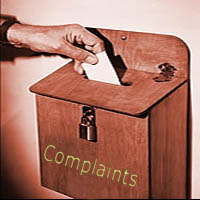This is the 3rd part of my blog series about dealing with threatening and violent residents.
 Another policy I have found helpful in minimizing resident aggression towards management or on site employees is to require all non-emergency resident complaints to be in writing, placed in a complaint drop box and forwarded to the owner, management company or the attorney for appropriate handling.
Another policy I have found helpful in minimizing resident aggression towards management or on site employees is to require all non-emergency resident complaints to be in writing, placed in a complaint drop box and forwarded to the owner, management company or the attorney for appropriate handling.
This policy does several things:
1) A written resident complaint policy with a drop box reduces managers or onsite employees from having to receive face to face complaints from residents that can often lead to escalating tempers and aggressive behavior by the resident towards the employee. The face-to-face encounter typically places the manager in a defensive position, which can be uncomfortable and problematic.
2) This policy takes (or appears to take) the decision-making regarding the handling of resident complaints out of the manager or on site employee’s control. Therefore the manager can “pass the buck” that the owner and/or attorney makes the decision on how a particular complaint is handled and can appear to be only a messenger of the complaints. Whether or not the manager actually makes the decision on how to handle the complaint is irrelevant, it is the appearance that the manager is not making the decision that is important. This may help alleviate resident backlash against the manager or on-site employee. Furthermore, the statement that all complaints will be handled “appropriately” depending on the circumstance, means that each complaint will be reviewed and a determination will be made as to which actions, if any, will be taken. It does not promise that every complaint will receive a response nor will every complaint receive action.
3) Requiring that all resident complaints be in writing, signed and dated can help reduce notice issues where the resident claims they gave verbal notice of the problem or complaint to the management.
* For specific inquiries regarding a threatening/violent tenant you may have, you’re welcome to visit my California Landlord – Tenant legal services page.
